Enterprise Law 700254: Assignment Solution on Contract and Partnership
VerifiedAdded on 2022/09/16
|8
|2341
|30
Homework Assignment
AI Summary
This document presents a detailed solution to an Enterprise Law assignment, addressing key concepts in contract and partnership law. The assignment involves three questions. The first question examines a scenario involving a shoe repair business, exploring issues of negligence, contract terms, and the doctrine of 'non est factum' within the framework of Australian Consumer Law. The second question delves into a partnership scenario, analyzing the liabilities of partners in an oral agreement, including issues of financial obligations, negligence, and the implications of starting a competing business. The third question explores various contract law scenarios, including counteroffers, unilateral contracts, and acceptance, with a focus on the application of the mirror image rule and postal rule. The solution provides legal analysis, referencing relevant case law and legal principles to support the conclusions for each question.
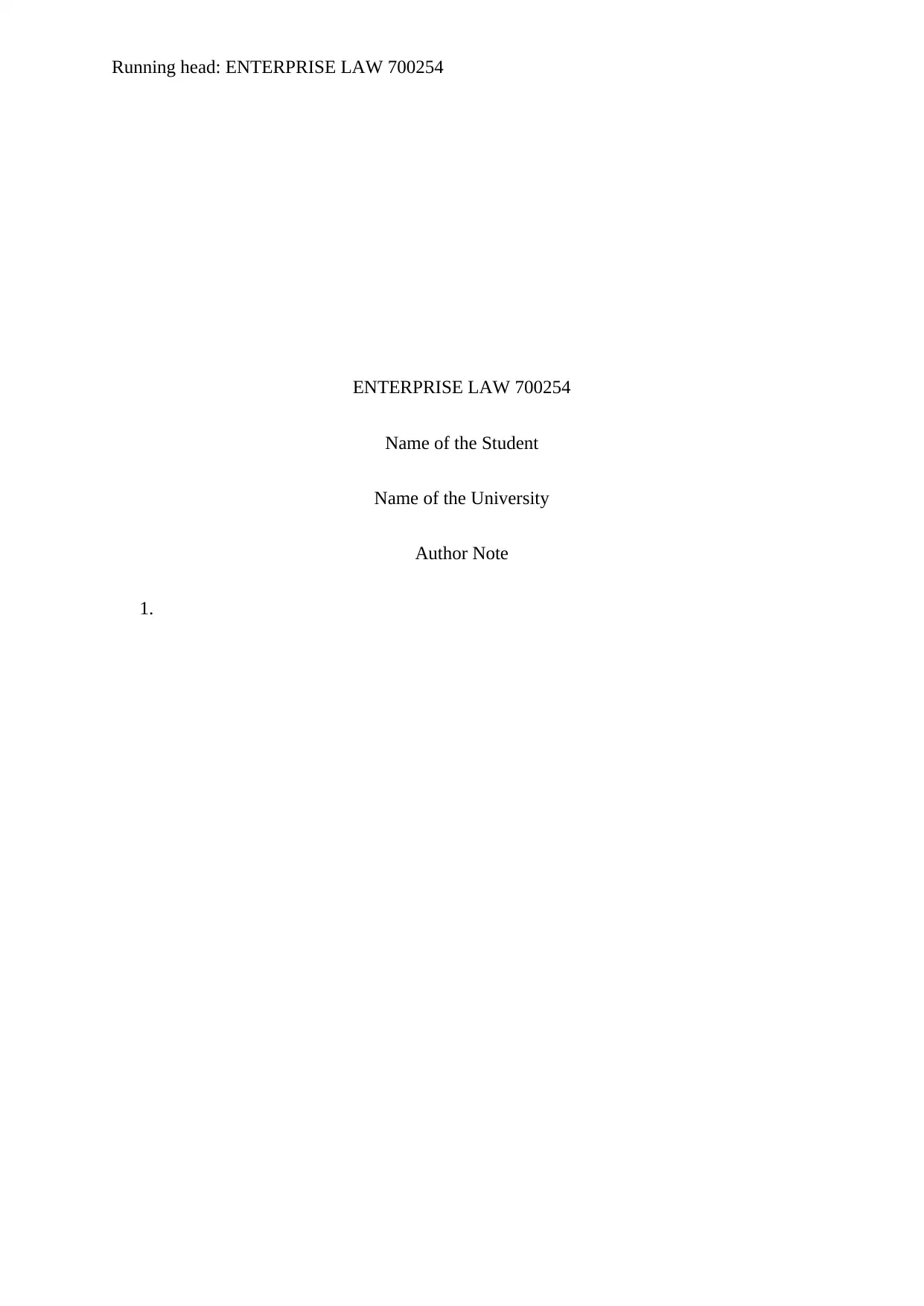
Running head: ENTERPRISE LAW 700254
ENTERPRISE LAW 700254
Name of the Student
Name of the University
Author Note
1.
ENTERPRISE LAW 700254
Name of the Student
Name of the University
Author Note
1.
Paraphrase This Document
Need a fresh take? Get an instant paraphrase of this document with our AI Paraphraser
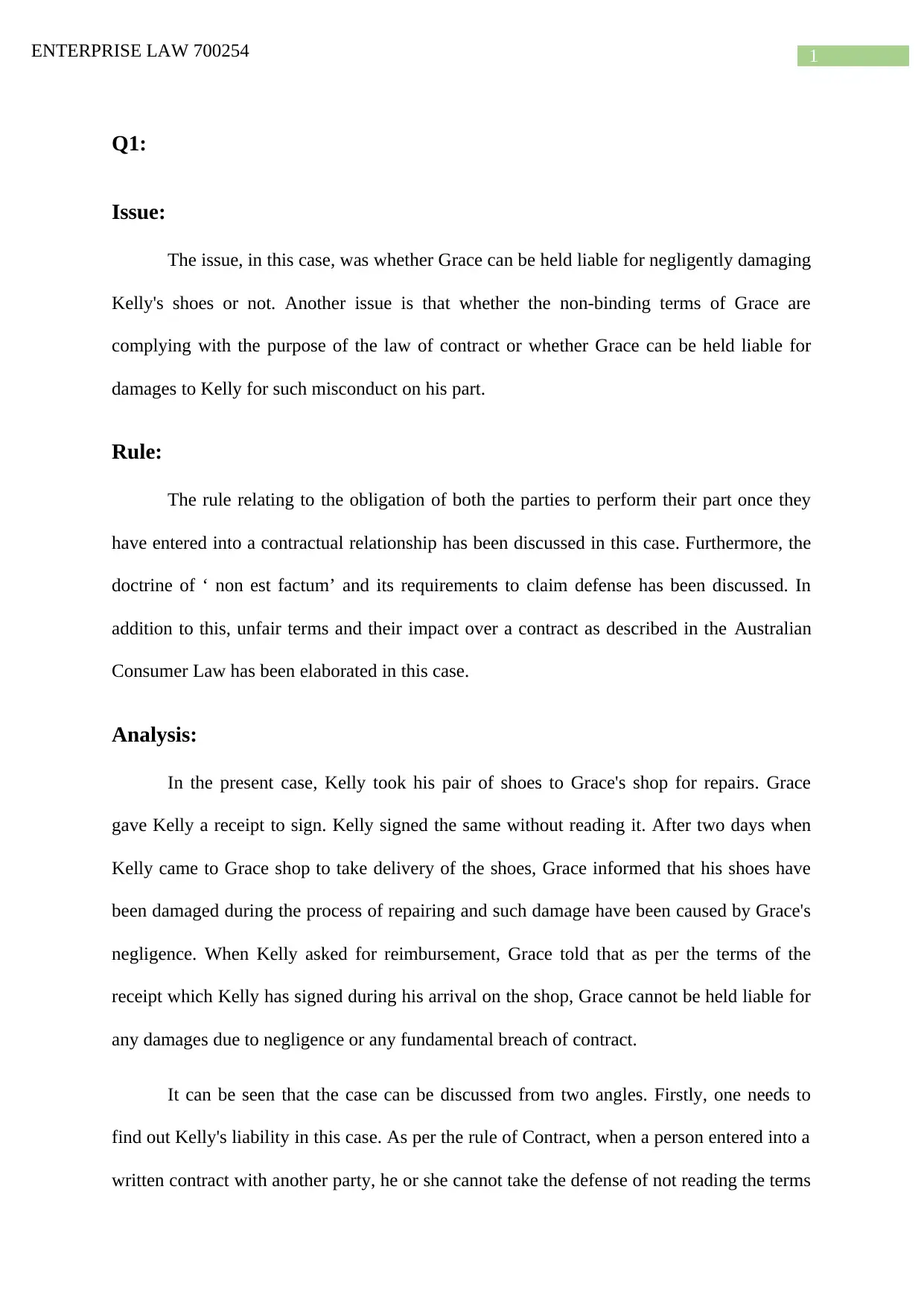
1ENTERPRISE LAW 700254
Q1:
Issue:
The issue, in this case, was whether Grace can be held liable for negligently damaging
Kelly's shoes or not. Another issue is that whether the non-binding terms of Grace are
complying with the purpose of the law of contract or whether Grace can be held liable for
damages to Kelly for such misconduct on his part.
Rule:
The rule relating to the obligation of both the parties to perform their part once they
have entered into a contractual relationship has been discussed in this case. Furthermore, the
doctrine of ‘ non est factum’ and its requirements to claim defense has been discussed. In
addition to this, unfair terms and their impact over a contract as described in the Australian
Consumer Law has been elaborated in this case.
Analysis:
In the present case, Kelly took his pair of shoes to Grace's shop for repairs. Grace
gave Kelly a receipt to sign. Kelly signed the same without reading it. After two days when
Kelly came to Grace shop to take delivery of the shoes, Grace informed that his shoes have
been damaged during the process of repairing and such damage have been caused by Grace's
negligence. When Kelly asked for reimbursement, Grace told that as per the terms of the
receipt which Kelly has signed during his arrival on the shop, Grace cannot be held liable for
any damages due to negligence or any fundamental breach of contract.
It can be seen that the case can be discussed from two angles. Firstly, one needs to
find out Kelly's liability in this case. As per the rule of Contract, when a person entered into a
written contract with another party, he or she cannot take the defense of not reading the terms
Q1:
Issue:
The issue, in this case, was whether Grace can be held liable for negligently damaging
Kelly's shoes or not. Another issue is that whether the non-binding terms of Grace are
complying with the purpose of the law of contract or whether Grace can be held liable for
damages to Kelly for such misconduct on his part.
Rule:
The rule relating to the obligation of both the parties to perform their part once they
have entered into a contractual relationship has been discussed in this case. Furthermore, the
doctrine of ‘ non est factum’ and its requirements to claim defense has been discussed. In
addition to this, unfair terms and their impact over a contract as described in the Australian
Consumer Law has been elaborated in this case.
Analysis:
In the present case, Kelly took his pair of shoes to Grace's shop for repairs. Grace
gave Kelly a receipt to sign. Kelly signed the same without reading it. After two days when
Kelly came to Grace shop to take delivery of the shoes, Grace informed that his shoes have
been damaged during the process of repairing and such damage have been caused by Grace's
negligence. When Kelly asked for reimbursement, Grace told that as per the terms of the
receipt which Kelly has signed during his arrival on the shop, Grace cannot be held liable for
any damages due to negligence or any fundamental breach of contract.
It can be seen that the case can be discussed from two angles. Firstly, one needs to
find out Kelly's liability in this case. As per the rule of Contract, when a person entered into a
written contract with another party, he or she cannot take the defense of not reading the terms
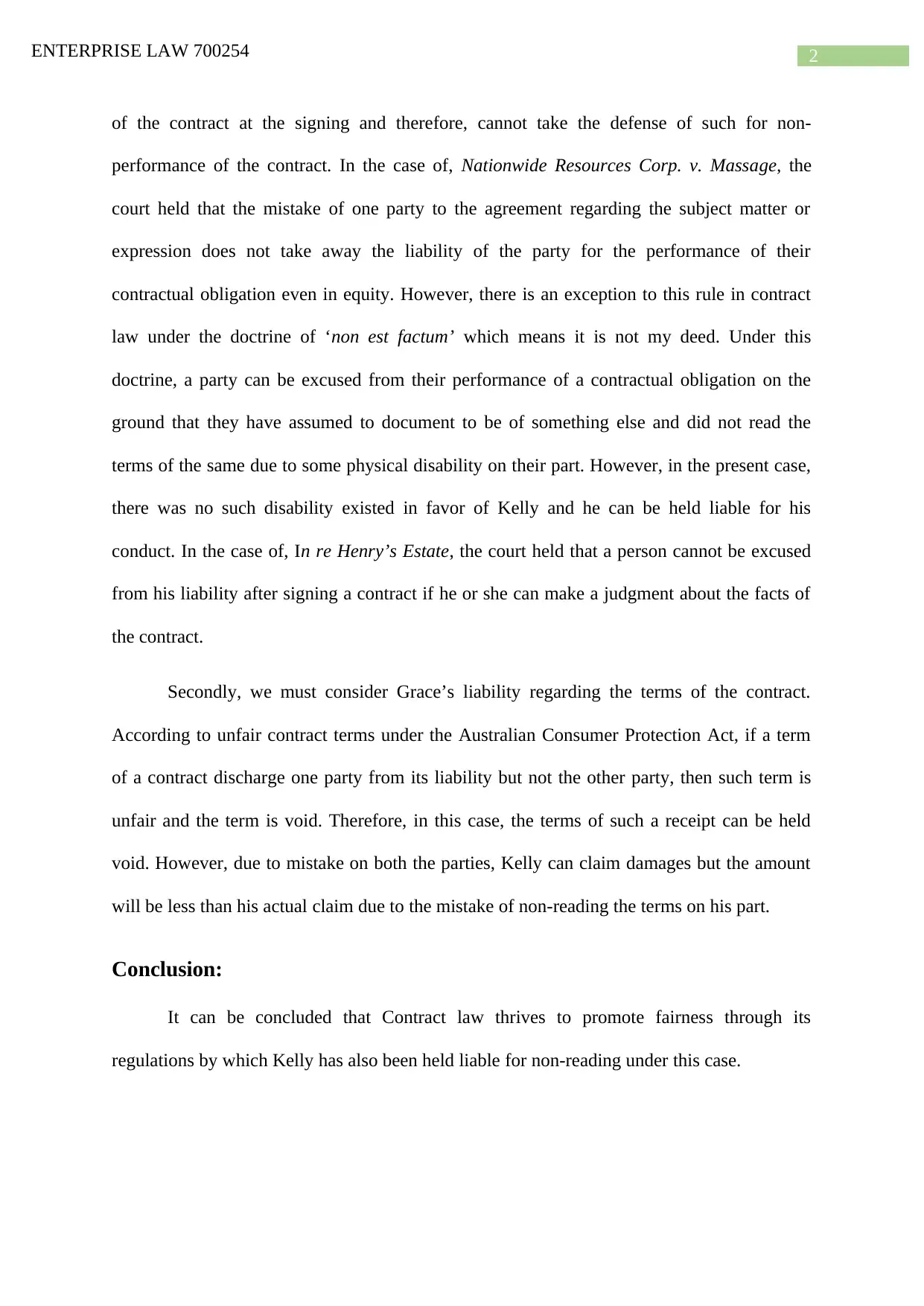
2ENTERPRISE LAW 700254
of the contract at the signing and therefore, cannot take the defense of such for non-
performance of the contract. In the case of, Nationwide Resources Corp. v. Massage, the
court held that the mistake of one party to the agreement regarding the subject matter or
expression does not take away the liability of the party for the performance of their
contractual obligation even in equity. However, there is an exception to this rule in contract
law under the doctrine of ‘non est factum’ which means it is not my deed. Under this
doctrine, a party can be excused from their performance of a contractual obligation on the
ground that they have assumed to document to be of something else and did not read the
terms of the same due to some physical disability on their part. However, in the present case,
there was no such disability existed in favor of Kelly and he can be held liable for his
conduct. In the case of, In re Henry’s Estate, the court held that a person cannot be excused
from his liability after signing a contract if he or she can make a judgment about the facts of
the contract.
Secondly, we must consider Grace’s liability regarding the terms of the contract.
According to unfair contract terms under the Australian Consumer Protection Act, if a term
of a contract discharge one party from its liability but not the other party, then such term is
unfair and the term is void. Therefore, in this case, the terms of such a receipt can be held
void. However, due to mistake on both the parties, Kelly can claim damages but the amount
will be less than his actual claim due to the mistake of non-reading the terms on his part.
Conclusion:
It can be concluded that Contract law thrives to promote fairness through its
regulations by which Kelly has also been held liable for non-reading under this case.
of the contract at the signing and therefore, cannot take the defense of such for non-
performance of the contract. In the case of, Nationwide Resources Corp. v. Massage, the
court held that the mistake of one party to the agreement regarding the subject matter or
expression does not take away the liability of the party for the performance of their
contractual obligation even in equity. However, there is an exception to this rule in contract
law under the doctrine of ‘non est factum’ which means it is not my deed. Under this
doctrine, a party can be excused from their performance of a contractual obligation on the
ground that they have assumed to document to be of something else and did not read the
terms of the same due to some physical disability on their part. However, in the present case,
there was no such disability existed in favor of Kelly and he can be held liable for his
conduct. In the case of, In re Henry’s Estate, the court held that a person cannot be excused
from his liability after signing a contract if he or she can make a judgment about the facts of
the contract.
Secondly, we must consider Grace’s liability regarding the terms of the contract.
According to unfair contract terms under the Australian Consumer Protection Act, if a term
of a contract discharge one party from its liability but not the other party, then such term is
unfair and the term is void. Therefore, in this case, the terms of such a receipt can be held
void. However, due to mistake on both the parties, Kelly can claim damages but the amount
will be less than his actual claim due to the mistake of non-reading the terms on his part.
Conclusion:
It can be concluded that Contract law thrives to promote fairness through its
regulations by which Kelly has also been held liable for non-reading under this case.
⊘ This is a preview!⊘
Do you want full access?
Subscribe today to unlock all pages.

Trusted by 1+ million students worldwide
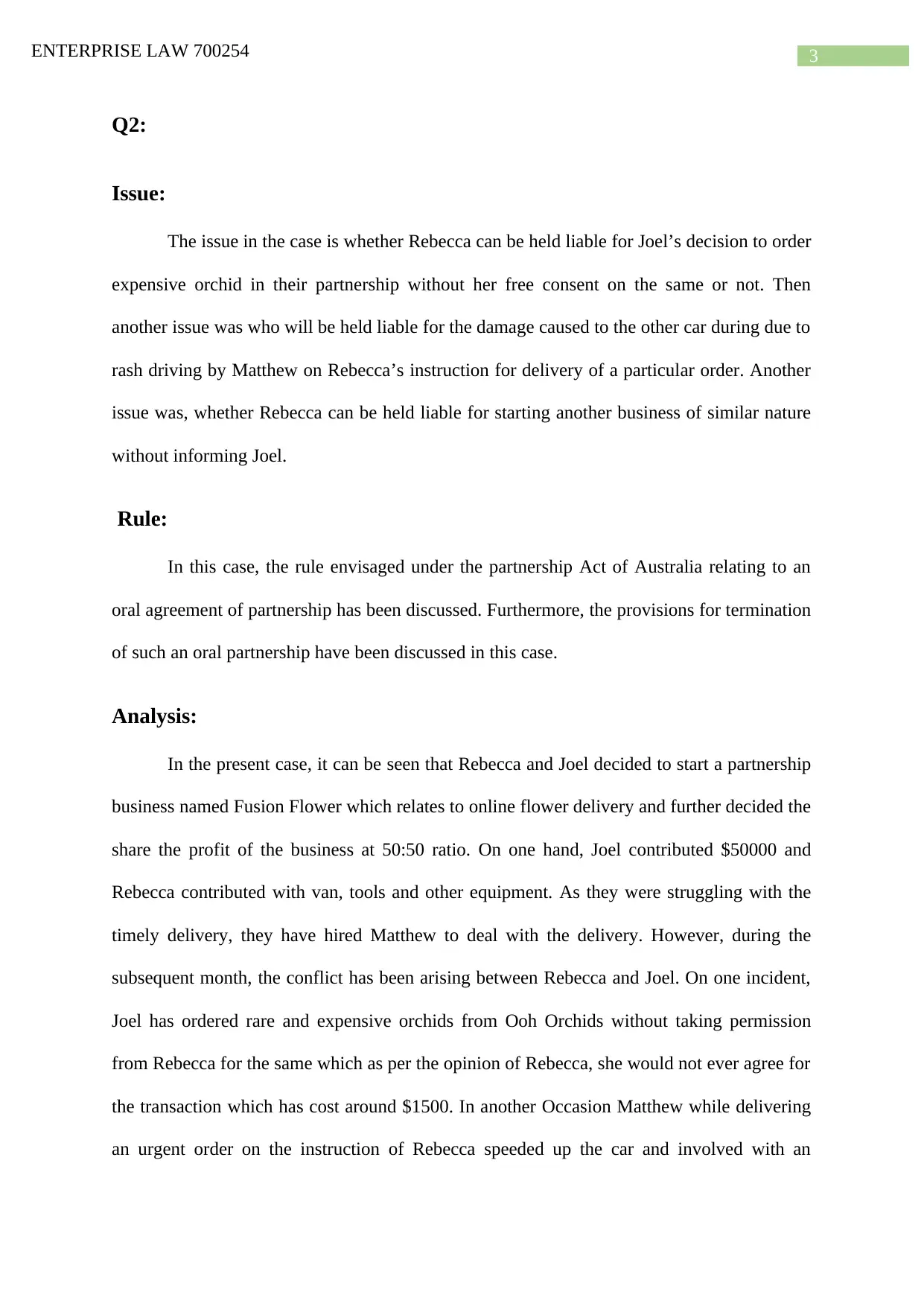
3ENTERPRISE LAW 700254
Q2:
Issue:
The issue in the case is whether Rebecca can be held liable for Joel’s decision to order
expensive orchid in their partnership without her free consent on the same or not. Then
another issue was who will be held liable for the damage caused to the other car during due to
rash driving by Matthew on Rebecca’s instruction for delivery of a particular order. Another
issue was, whether Rebecca can be held liable for starting another business of similar nature
without informing Joel.
Rule:
In this case, the rule envisaged under the partnership Act of Australia relating to an
oral agreement of partnership has been discussed. Furthermore, the provisions for termination
of such an oral partnership have been discussed in this case.
Analysis:
In the present case, it can be seen that Rebecca and Joel decided to start a partnership
business named Fusion Flower which relates to online flower delivery and further decided the
share the profit of the business at 50:50 ratio. On one hand, Joel contributed $50000 and
Rebecca contributed with van, tools and other equipment. As they were struggling with the
timely delivery, they have hired Matthew to deal with the delivery. However, during the
subsequent month, the conflict has been arising between Rebecca and Joel. On one incident,
Joel has ordered rare and expensive orchids from Ooh Orchids without taking permission
from Rebecca for the same which as per the opinion of Rebecca, she would not ever agree for
the transaction which has cost around $1500. In another Occasion Matthew while delivering
an urgent order on the instruction of Rebecca speeded up the car and involved with an
Q2:
Issue:
The issue in the case is whether Rebecca can be held liable for Joel’s decision to order
expensive orchid in their partnership without her free consent on the same or not. Then
another issue was who will be held liable for the damage caused to the other car during due to
rash driving by Matthew on Rebecca’s instruction for delivery of a particular order. Another
issue was, whether Rebecca can be held liable for starting another business of similar nature
without informing Joel.
Rule:
In this case, the rule envisaged under the partnership Act of Australia relating to an
oral agreement of partnership has been discussed. Furthermore, the provisions for termination
of such an oral partnership have been discussed in this case.
Analysis:
In the present case, it can be seen that Rebecca and Joel decided to start a partnership
business named Fusion Flower which relates to online flower delivery and further decided the
share the profit of the business at 50:50 ratio. On one hand, Joel contributed $50000 and
Rebecca contributed with van, tools and other equipment. As they were struggling with the
timely delivery, they have hired Matthew to deal with the delivery. However, during the
subsequent month, the conflict has been arising between Rebecca and Joel. On one incident,
Joel has ordered rare and expensive orchids from Ooh Orchids without taking permission
from Rebecca for the same which as per the opinion of Rebecca, she would not ever agree for
the transaction which has cost around $1500. In another Occasion Matthew while delivering
an urgent order on the instruction of Rebecca speeded up the car and involved with an
Paraphrase This Document
Need a fresh take? Get an instant paraphrase of this document with our AI Paraphraser
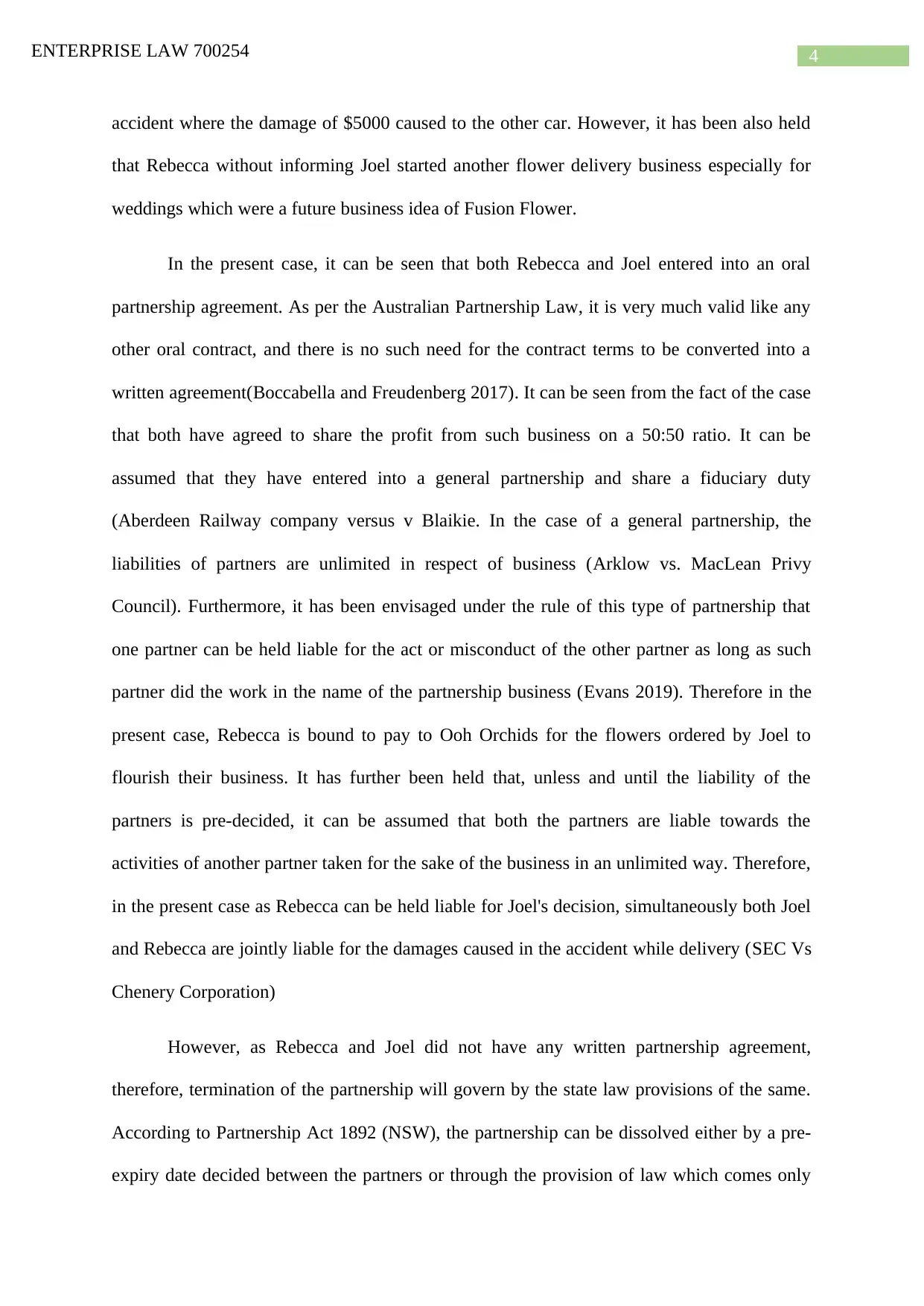
4ENTERPRISE LAW 700254
accident where the damage of $5000 caused to the other car. However, it has been also held
that Rebecca without informing Joel started another flower delivery business especially for
weddings which were a future business idea of Fusion Flower.
In the present case, it can be seen that both Rebecca and Joel entered into an oral
partnership agreement. As per the Australian Partnership Law, it is very much valid like any
other oral contract, and there is no such need for the contract terms to be converted into a
written agreement(Boccabella and Freudenberg 2017). It can be seen from the fact of the case
that both have agreed to share the profit from such business on a 50:50 ratio. It can be
assumed that they have entered into a general partnership and share a fiduciary duty
(Aberdeen Railway company versus v Blaikie. In the case of a general partnership, the
liabilities of partners are unlimited in respect of business (Arklow vs. MacLean Privy
Council). Furthermore, it has been envisaged under the rule of this type of partnership that
one partner can be held liable for the act or misconduct of the other partner as long as such
partner did the work in the name of the partnership business (Evans 2019). Therefore in the
present case, Rebecca is bound to pay to Ooh Orchids for the flowers ordered by Joel to
flourish their business. It has further been held that, unless and until the liability of the
partners is pre-decided, it can be assumed that both the partners are liable towards the
activities of another partner taken for the sake of the business in an unlimited way. Therefore,
in the present case as Rebecca can be held liable for Joel's decision, simultaneously both Joel
and Rebecca are jointly liable for the damages caused in the accident while delivery (SEC Vs
Chenery Corporation)
However, as Rebecca and Joel did not have any written partnership agreement,
therefore, termination of the partnership will govern by the state law provisions of the same.
According to Partnership Act 1892 (NSW), the partnership can be dissolved either by a pre-
expiry date decided between the partners or through the provision of law which comes only
accident where the damage of $5000 caused to the other car. However, it has been also held
that Rebecca without informing Joel started another flower delivery business especially for
weddings which were a future business idea of Fusion Flower.
In the present case, it can be seen that both Rebecca and Joel entered into an oral
partnership agreement. As per the Australian Partnership Law, it is very much valid like any
other oral contract, and there is no such need for the contract terms to be converted into a
written agreement(Boccabella and Freudenberg 2017). It can be seen from the fact of the case
that both have agreed to share the profit from such business on a 50:50 ratio. It can be
assumed that they have entered into a general partnership and share a fiduciary duty
(Aberdeen Railway company versus v Blaikie. In the case of a general partnership, the
liabilities of partners are unlimited in respect of business (Arklow vs. MacLean Privy
Council). Furthermore, it has been envisaged under the rule of this type of partnership that
one partner can be held liable for the act or misconduct of the other partner as long as such
partner did the work in the name of the partnership business (Evans 2019). Therefore in the
present case, Rebecca is bound to pay to Ooh Orchids for the flowers ordered by Joel to
flourish their business. It has further been held that, unless and until the liability of the
partners is pre-decided, it can be assumed that both the partners are liable towards the
activities of another partner taken for the sake of the business in an unlimited way. Therefore,
in the present case as Rebecca can be held liable for Joel's decision, simultaneously both Joel
and Rebecca are jointly liable for the damages caused in the accident while delivery (SEC Vs
Chenery Corporation)
However, as Rebecca and Joel did not have any written partnership agreement,
therefore, termination of the partnership will govern by the state law provisions of the same.
According to Partnership Act 1892 (NSW), the partnership can be dissolved either by a pre-
expiry date decided between the partners or through the provision of law which comes only
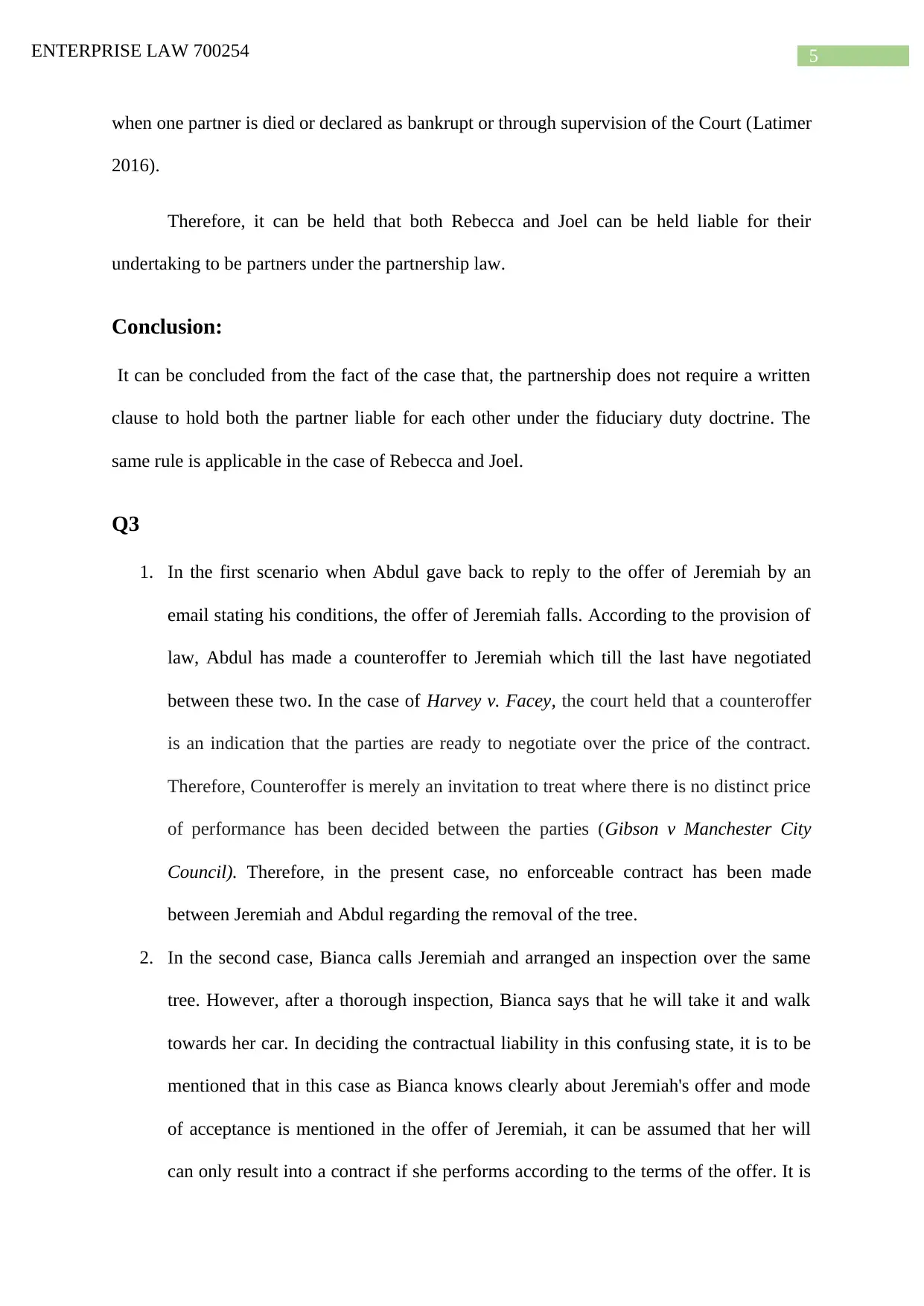
5ENTERPRISE LAW 700254
when one partner is died or declared as bankrupt or through supervision of the Court (Latimer
2016).
Therefore, it can be held that both Rebecca and Joel can be held liable for their
undertaking to be partners under the partnership law.
Conclusion:
It can be concluded from the fact of the case that, the partnership does not require a written
clause to hold both the partner liable for each other under the fiduciary duty doctrine. The
same rule is applicable in the case of Rebecca and Joel.
Q3
1. In the first scenario when Abdul gave back to reply to the offer of Jeremiah by an
email stating his conditions, the offer of Jeremiah falls. According to the provision of
law, Abdul has made a counteroffer to Jeremiah which till the last have negotiated
between these two. In the case of Harvey v. Facey, the court held that a counteroffer
is an indication that the parties are ready to negotiate over the price of the contract.
Therefore, Counteroffer is merely an invitation to treat where there is no distinct price
of performance has been decided between the parties (Gibson v Manchester City
Council). Therefore, in the present case, no enforceable contract has been made
between Jeremiah and Abdul regarding the removal of the tree.
2. In the second case, Bianca calls Jeremiah and arranged an inspection over the same
tree. However, after a thorough inspection, Bianca says that he will take it and walk
towards her car. In deciding the contractual liability in this confusing state, it is to be
mentioned that in this case as Bianca knows clearly about Jeremiah's offer and mode
of acceptance is mentioned in the offer of Jeremiah, it can be assumed that her will
can only result into a contract if she performs according to the terms of the offer. It is
when one partner is died or declared as bankrupt or through supervision of the Court (Latimer
2016).
Therefore, it can be held that both Rebecca and Joel can be held liable for their
undertaking to be partners under the partnership law.
Conclusion:
It can be concluded from the fact of the case that, the partnership does not require a written
clause to hold both the partner liable for each other under the fiduciary duty doctrine. The
same rule is applicable in the case of Rebecca and Joel.
Q3
1. In the first scenario when Abdul gave back to reply to the offer of Jeremiah by an
email stating his conditions, the offer of Jeremiah falls. According to the provision of
law, Abdul has made a counteroffer to Jeremiah which till the last have negotiated
between these two. In the case of Harvey v. Facey, the court held that a counteroffer
is an indication that the parties are ready to negotiate over the price of the contract.
Therefore, Counteroffer is merely an invitation to treat where there is no distinct price
of performance has been decided between the parties (Gibson v Manchester City
Council). Therefore, in the present case, no enforceable contract has been made
between Jeremiah and Abdul regarding the removal of the tree.
2. In the second case, Bianca calls Jeremiah and arranged an inspection over the same
tree. However, after a thorough inspection, Bianca says that he will take it and walk
towards her car. In deciding the contractual liability in this confusing state, it is to be
mentioned that in this case as Bianca knows clearly about Jeremiah's offer and mode
of acceptance is mentioned in the offer of Jeremiah, it can be assumed that her will
can only result into a contract if she performs according to the terms of the offer. It is
⊘ This is a preview!⊘
Do you want full access?
Subscribe today to unlock all pages.

Trusted by 1+ million students worldwide
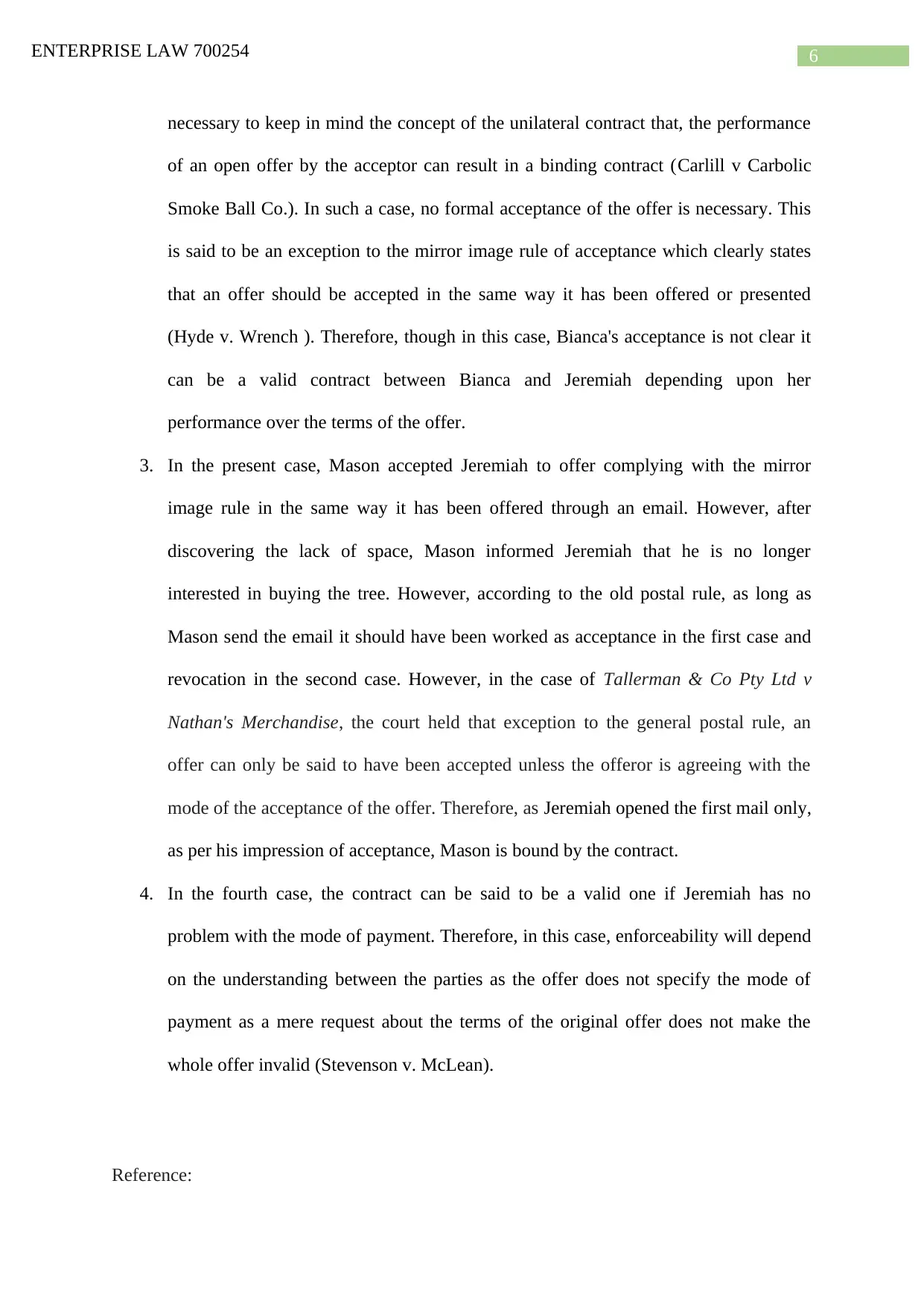
6ENTERPRISE LAW 700254
necessary to keep in mind the concept of the unilateral contract that, the performance
of an open offer by the acceptor can result in a binding contract (Carlill v Carbolic
Smoke Ball Co.). In such a case, no formal acceptance of the offer is necessary. This
is said to be an exception to the mirror image rule of acceptance which clearly states
that an offer should be accepted in the same way it has been offered or presented
(Hyde v. Wrench ). Therefore, though in this case, Bianca's acceptance is not clear it
can be a valid contract between Bianca and Jeremiah depending upon her
performance over the terms of the offer.
3. In the present case, Mason accepted Jeremiah to offer complying with the mirror
image rule in the same way it has been offered through an email. However, after
discovering the lack of space, Mason informed Jeremiah that he is no longer
interested in buying the tree. However, according to the old postal rule, as long as
Mason send the email it should have been worked as acceptance in the first case and
revocation in the second case. However, in the case of Tallerman & Co Pty Ltd v
Nathan's Merchandise, the court held that exception to the general postal rule, an
offer can only be said to have been accepted unless the offeror is agreeing with the
mode of the acceptance of the offer. Therefore, as Jeremiah opened the first mail only,
as per his impression of acceptance, Mason is bound by the contract.
4. In the fourth case, the contract can be said to be a valid one if Jeremiah has no
problem with the mode of payment. Therefore, in this case, enforceability will depend
on the understanding between the parties as the offer does not specify the mode of
payment as a mere request about the terms of the original offer does not make the
whole offer invalid (Stevenson v. McLean).
Reference:
necessary to keep in mind the concept of the unilateral contract that, the performance
of an open offer by the acceptor can result in a binding contract (Carlill v Carbolic
Smoke Ball Co.). In such a case, no formal acceptance of the offer is necessary. This
is said to be an exception to the mirror image rule of acceptance which clearly states
that an offer should be accepted in the same way it has been offered or presented
(Hyde v. Wrench ). Therefore, though in this case, Bianca's acceptance is not clear it
can be a valid contract between Bianca and Jeremiah depending upon her
performance over the terms of the offer.
3. In the present case, Mason accepted Jeremiah to offer complying with the mirror
image rule in the same way it has been offered through an email. However, after
discovering the lack of space, Mason informed Jeremiah that he is no longer
interested in buying the tree. However, according to the old postal rule, as long as
Mason send the email it should have been worked as acceptance in the first case and
revocation in the second case. However, in the case of Tallerman & Co Pty Ltd v
Nathan's Merchandise, the court held that exception to the general postal rule, an
offer can only be said to have been accepted unless the offeror is agreeing with the
mode of the acceptance of the offer. Therefore, as Jeremiah opened the first mail only,
as per his impression of acceptance, Mason is bound by the contract.
4. In the fourth case, the contract can be said to be a valid one if Jeremiah has no
problem with the mode of payment. Therefore, in this case, enforceability will depend
on the understanding between the parties as the offer does not specify the mode of
payment as a mere request about the terms of the original offer does not make the
whole offer invalid (Stevenson v. McLean).
Reference:
Paraphrase This Document
Need a fresh take? Get an instant paraphrase of this document with our AI Paraphraser
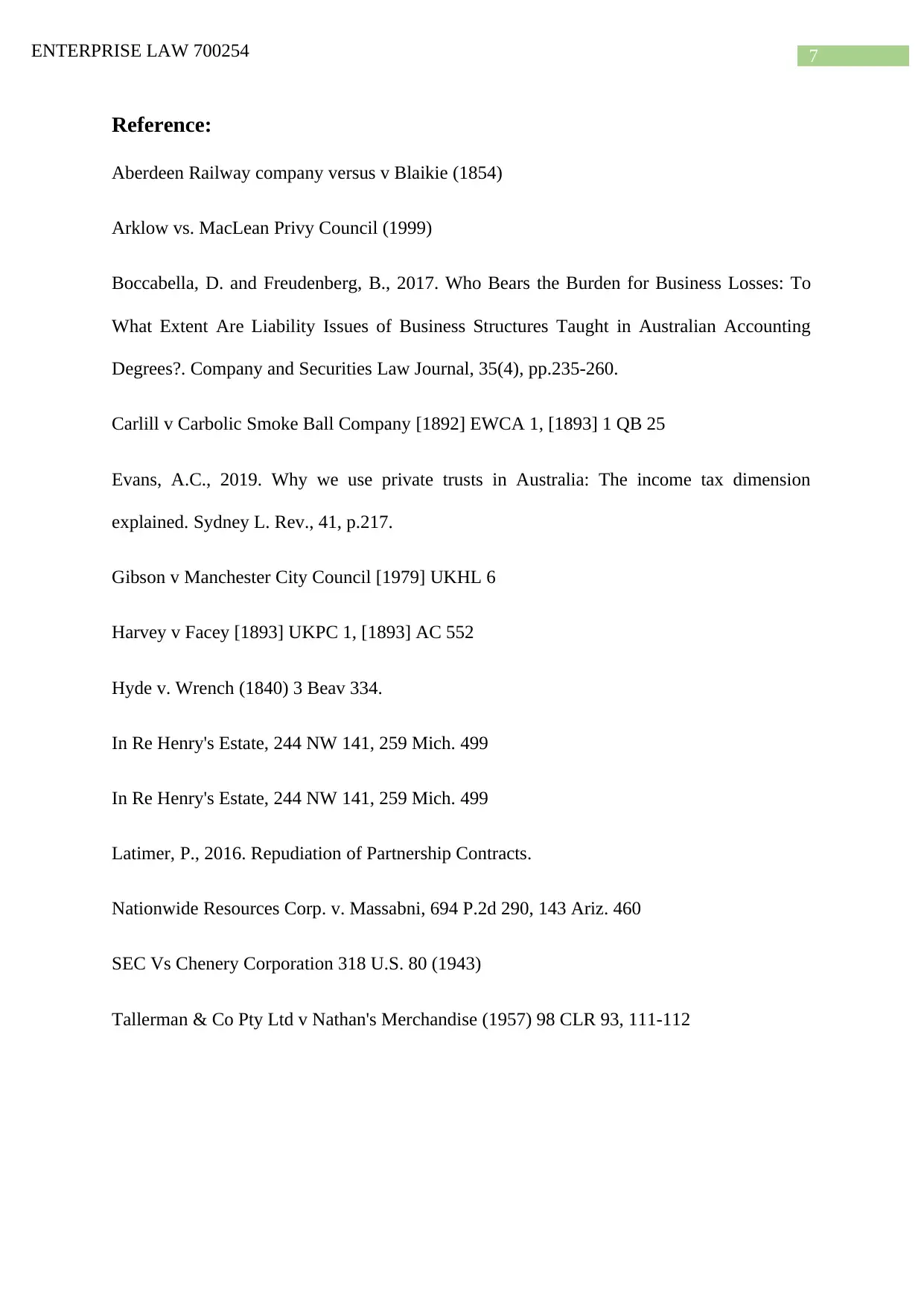
7ENTERPRISE LAW 700254
Reference:
Aberdeen Railway company versus v Blaikie (1854)
Arklow vs. MacLean Privy Council (1999)
Boccabella, D. and Freudenberg, B., 2017. Who Bears the Burden for Business Losses: To
What Extent Are Liability Issues of Business Structures Taught in Australian Accounting
Degrees?. Company and Securities Law Journal, 35(4), pp.235-260.
Carlill v Carbolic Smoke Ball Company [1892] EWCA 1, [1893] 1 QB 25
Evans, A.C., 2019. Why we use private trusts in Australia: The income tax dimension
explained. Sydney L. Rev., 41, p.217.
Gibson v Manchester City Council [1979] UKHL 6
Harvey v Facey [1893] UKPC 1, [1893] AC 552
Hyde v. Wrench (1840) 3 Beav 334.
In Re Henry's Estate, 244 NW 141, 259 Mich. 499
In Re Henry's Estate, 244 NW 141, 259 Mich. 499
Latimer, P., 2016. Repudiation of Partnership Contracts.
Nationwide Resources Corp. v. Massabni, 694 P.2d 290, 143 Ariz. 460
SEC Vs Chenery Corporation 318 U.S. 80 (1943)
Tallerman & Co Pty Ltd v Nathan's Merchandise (1957) 98 CLR 93, 111-112
Reference:
Aberdeen Railway company versus v Blaikie (1854)
Arklow vs. MacLean Privy Council (1999)
Boccabella, D. and Freudenberg, B., 2017. Who Bears the Burden for Business Losses: To
What Extent Are Liability Issues of Business Structures Taught in Australian Accounting
Degrees?. Company and Securities Law Journal, 35(4), pp.235-260.
Carlill v Carbolic Smoke Ball Company [1892] EWCA 1, [1893] 1 QB 25
Evans, A.C., 2019. Why we use private trusts in Australia: The income tax dimension
explained. Sydney L. Rev., 41, p.217.
Gibson v Manchester City Council [1979] UKHL 6
Harvey v Facey [1893] UKPC 1, [1893] AC 552
Hyde v. Wrench (1840) 3 Beav 334.
In Re Henry's Estate, 244 NW 141, 259 Mich. 499
In Re Henry's Estate, 244 NW 141, 259 Mich. 499
Latimer, P., 2016. Repudiation of Partnership Contracts.
Nationwide Resources Corp. v. Massabni, 694 P.2d 290, 143 Ariz. 460
SEC Vs Chenery Corporation 318 U.S. 80 (1943)
Tallerman & Co Pty Ltd v Nathan's Merchandise (1957) 98 CLR 93, 111-112
1 out of 8
Related Documents
Your All-in-One AI-Powered Toolkit for Academic Success.
+13062052269
info@desklib.com
Available 24*7 on WhatsApp / Email
![[object Object]](/_next/static/media/star-bottom.7253800d.svg)
Unlock your academic potential
Copyright © 2020–2025 A2Z Services. All Rights Reserved. Developed and managed by ZUCOL.





